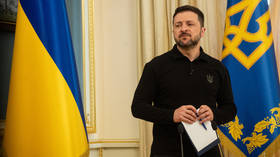The ‘Russian bots’ that weren't: Twitter backtracks on troll claims, media ignores updated info

Twitter quietly revised its public database of ‘Russian bot’ accounts earlier this month, removing 228 accounts it previously said were “connected to Russia”— but the admission has gone almost completely unnoticed by the media.
Bloomberg reported on the “burst of activity” from the bot accounts and claimed that Russia's “social-media trolling operation” was “stepping up its Twitter presence to new heights.”
Fast-forward to 2019 and Twitter has removed 228 of these accounts from the database, saying they had “initially misidentified” them as being linked to Russia, but nobody in the media seems to have noticed.
In fact, Bloomberg is the only major US outlet which bothered to correct the story to reflect reality, admitting that Twitter’s changes to the dataset “invalidate central portions” of its original report and that there was “no surge” in this so-called Russian bot activity at the time in question. Oops!
In this case, we initially misidentified 228 accounts as connected to Russia. As our investigations into their activity continued, we uncovered additional information allowing us to more confidently associate them with Venezuela.
— Yoel Roth (@yoyoel) February 5, 2019
Pivot to Venezuela!
Interestingly, the highlighted accounts have now been linked to Venezuela, another country the US government just so happens to have bad blood with.
In a tweet, Twitter’s “head of site integrity” Yoel Roth said that the company can now “more confidently associate” the 228 accounts with Venezuela. Roth’s short tweet thread on the misidentification was met with little interest receiving only a few retweets and no attention from media figures who supposedly actively follow any and all news remotely related to Russian activity online.
Also on rt.com Emily Ratajkowski in hot water for confusing Ukraine with Russia in Harper’s Bazaar coverIn a statement to Bloomberg, Roth later admitted that “definitive attribution is very, very difficult.” The Bloomberg mea culpa also noted that Twitter is “reluctant to discuss” how it connects accounts to so-called trolling networks in the first place.
Some on Twitter quickly pointed out that the timing of the pivot to focus on Venezuelan bots was curious, given the US’ recent efforts to engineer regime change against the government of Nicolas Maduro.
Journalist Sam Sacks tweeted that the new information about Venezuelan bots was “convenient” and said that the vast majority of stories written about Russian trolls and their alleged social media activity are “based on junk research.” Sacks also questioned why anyone should have faith in the credibility of such flawed analyses going forward.
In the last few years, there have been thousands of stories written about what Russian trolls are doing on social media, and 99% of those articles are based on junk research.
— Sam Sacks (@SamSacks) February 22, 2019
What methodology led you to the wrong conclusion in the first place? How many similar mistake have been made trying to identify Russian trolls? What makes this new conclusion credible? Don't hold your breath for answers... pic.twitter.com/MsYxDyffAK
— Sam Sacks (@SamSacks) February 22, 2019
Another Twitter user found it odd that Twitter and Bloomberg had “suddenly discovered” that bots it claimed were Russian had “miraculously turned into Venezuelans.”
Or that Bloomberg suddenly discovered that trolls it previously claimed were Russian had miraculously turned into Venezuelans.https://t.co/uffMWpyzjb
— Left I on the News (@leftiblog) February 24, 2019
Pattern of fake ‘Russian bots’
When it comes to the hot topic of Russian bots and trolls, the media and various social media monitoring groups have suffered unfortunate “misidentification” incidents before.
In 2017, an African American activist Charlie Peach was suspended from Twitter during one of the company's purges of accounts purportedly linked to Russia, a claim that was happily echoed later by multiple major media outlets. Peach told RT at the time that Twitter was engaging in “suppression of voices” using the “Russian scare tactic.”
Twitter users in the UK have also been swept up into the hysteria over Russian bots based on their political opinions, with some accounts belonging to real people even being listed in a UK government report on nefarious Russian activity online.
More recently, a dodgy US-based cybersecurity firm called New Knowledge was busted by the New York Times for creating an army of fake Russian bots in order to secretly influence an Alabama election by accusing one candidate of being ‘supported’ by the fake accounts. Yet, despite its own dirty tricks being exposed, the firm is still cited by major US media outlets as a legitimate source of information on Russian “disinformation” online.
So it seems media interest in Russian bot stories waxes and wanes based on whether or not the information bolsters the ‘correct’ narrative.
Think your friends would be interested? Share this story!















